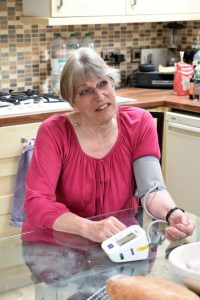Around one in three adults in the UK has high blood pressure (also known as hypertension). In England, the condition affects 31% of men and 26% of women (Blood Pressure UK, 2021). According to Blood Pressure UK, around six million people in the UK have high blood pressure and don’t know it. This is a problem because approximately half of all strokes and heart attacks are the result of high blood pressure and can often be prevented with medications and lifestyle changes (Blood Pressure UK). Blood pressure is a pretty important bit of health information, particularly in older people, so why do so many people not know anything about it?
In January 2022, the AHSN launched the national blood pressure optimisation programme, which aims to transform the prevention of cardiovascular disease by improving the self-management of people with hypertension.
To help support this programme in the East of England, we conducted an online survey to gain insight into people’s understanding and perception of the condition and use of remote monitoring for blood pressure. We know that people’s health outcomes and experiences in accessing services are often affected by wider determinants of health, such as location, ethnicity, gender and age (Bibby, 2018). We hoped that the survey results would provide valuable information about whether this is the same for blood pressure and would provide insight for our NHS colleagues to support quality improvement and data-led decisions on commissioning and healthcare.
In collaboration with local PPI groups, such as the Citizens’ Senate, we aimed to focus the survey on the following themes: understanding of hypertension, their behaviours, challenges or barriers and preferences for home monitoring.
We tried to ensure we gathered a broad range of insight by working with partners in our local integrated care systems (ICSs), charity organisations (e.g., Blood Pressure UK, Heart UK and British Heart Foundation), HealthWatch and Health Innovation East’s own channels. We also targeted specific often-underrepresented demographics through Facebook.
 What people told us
What people told us
We received 723 responses, of which 73% were 60 to 79-year-olds. 49% of respondents identified as male and 51% as female.
Feedback suggested that people’s awareness could be improved through better public advice, and education (e.g. signposting to prevention campaigns or materials such as Calculate your heart age; Know Your Numbers! and NHS Prevention High Blood Pressure) and suggests that there’s an appetite for social prescribing (e.g., referral to healthy lifestyle services such as physical activity, weight/stress management, nutritional advice, smoking cessation services) to reduce risk of developing hypertension or worsening their condition.
People highlighted the desire to have improved access to GP appointments, including being offered equitable assessments or at least signposting to available services at the first attempt. Although challenging for primary care, it is hoped that part of the GP Contract 23/24 changes will support GP practices to continue to use innovative approaches to increase access.
What does this mean?
From the overall results of the survey, Health Innovation East has made the following recommendations:
- Continue to promote the importance of a population approach to education and advice on the causes, prevention, and self-management of high blood pressure through initiatives such as ‘Making Every Contact Count’, ‘Know your Numbers!, ‘Calculate your heart age; and NHS Prevention High Blood Pressure.
- Consider how quality and regularity of contact with patients can be improved, including utilising the wider workforce to maximise opportunities for risk stratification, assessments, signposting, education and BP conversations and tests into existing contact points.
- Consider the importance of healthy lifestyle changes for people’s health and this can be done through social prescribing services (e.g., referral to healthy lifestyle services, weight/stress management, nutritional advice, and smoking cessation services).
- Reassurance to patients who are submitting regular BP readings that this is valued and is being used to inform medication reviews/follow-ups by health care professionals/pharmacists, including time to discuss concerns around side effects.
The focus going forward is to continue to support primary care and ICSs to utilise available tools to support the improvements of hypertension case finding and optimisation. This includes understanding the number of population health management digital tools available such as the UCL Partners hypertension frameworks; Ardens; Eclipse Live; CDRC as well as a patient search tool review paper available to access here. These include tools for searches and risk stratification, recommendations for the utilisation of the wider workforce and resources for education around lifestyle and self-management.
Promotion and adherence to other local hypertension programmes may be considered. This includes the Hypertension case-finding service, and BP@home programme to allow for increased community and at-home monitoring and clear, standardised processes for submitting readings and appropriate follow-ups.
Read the survey summary report
You can access and download the full blood pressure survey summary report or a supporting infographic.
IF you want to learn more about this work, contact cvdteam@healthinnovationeast.co.uk.
References
- Bibby, J. (2018) What makes us healthy? An introduction to the social determinants of health. Health Foundation (www.health.org.uk/publications/what-makes-us-healthy).
- Blood Pressure UK: Blood pressure facts and figures (Blood Pressure UK)
- Blood Pressure UK: Know Your Numbers! (Blood Pressure UK)
About me
My name is Katherine Cummergen and I am a Senior Advisor working in the Health Innovation East’s delivery team where I have been leading the UCL Partner’s national Blood Pressure Optimisation Programme (BPO) in the East of England. I have a BSc in Psychology and a Master’s in Clinical Research, and over ten years’ experience of managing projects in various clinical and research departments in the NHS, including the Applied Research Collaboration (East of England) and the National Institute of Health Research.
Share your idea
Do you have a great idea that could deliver meaningful change in the real world?
Get involved